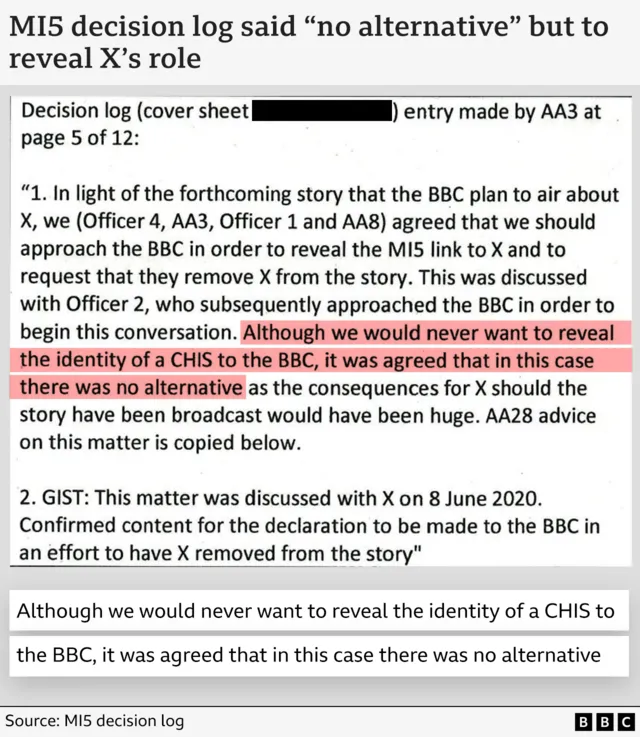MI5 Accused of Systematically Misleading Courts with Falsehoods in Spy Abuse Case
MI5 Accused of Systematically Misleading Courts with Falsehoods in Spy Abuse Case
In a significant blow to its credibility, the UK’s domestic security service, MI5, has been found to have systematically provided false and misleading evidence to multiple courts, a revelation that has prompted a High Court ruling demanding a more thorough investigation into the matter.
The controversy stems from the case of a state agent, identified only as “X,” who was under MI5’s control and accused of severe abuse against women, including his former girlfriend, “Beth.” The BBC’s investigations correspondent, Daniel De Simone, uncovered evidence of X’s violent misogyny and abusive tendencies, including threats of violence against a child and cannibalistic fantasies. Despite this, MI5 initially attempted to suppress De Simone’s reporting, leading to a complex legal battle.

MI5’s initial defense involved asserting its policy of “neither confirming nor denying” (NCND) the identities of its informants. However, the service repeatedly provided false evidence to the courts, claiming it adhered to this policy even when evidence, including recordings of conversations with De Simone, proved otherwise. This deception was aimed at protecting X’s identity and MI5’s role, particularly to prevent “Beth” from accessing crucial information in her legal case against the agency.
Following the BBC’s exposure of these falsehoods, MI5 Director General Sir Ken McCallum issued an “unreserved apology” to the court. Two internal investigations were launched: one by MI5 itself and an external review by Sir Jonathan Jones KC. However, the High Court deemed these inquiries “deficient,” highlighting that they failed to interview key witnesses, including the journalist who broke the story, and that crucial exculpatory evidence was withheld.
Internal Reviews Criticized for Deficiencies
The court’s ruling revealed significant flaws in MI5’s internal investigations. For instance, the investigations suggested that a senior MI5 officer, “Officer 2,” who had spoken with De Simone, suffered from a “fallibility of memory” regarding whether he had departed from the NCND policy. However, subsequently disclosed internal MI5 documents, which the service had attempted to keep secret, directly contradicted this. These documents included a decision log stating the plan was to “reveal the MI5 link to X” and notes from a meeting where X himself approved of the plan to meet with the journalist.

Furthermore, the investigations failed to uncover evidence of at least five other instances where MI5 officers had departed from the NCND policy. These included disclosing the involvement of an undercover officer, a highly sensitive piece of information. The court found that MI5 had actively concealed these records, which demonstrated a clear understanding within the service that NCND had been breached.
In one particularly egregious instance, an internal MI5 note revealed that an officer attempted to convince colleagues that no NCND breach had occurred, despite their own handling team member stating, “We have already named him pal.” This suggests a concerted effort to create a false narrative to present to the courts.
MI5’s Misleading Statements and Withheld Evidence
The court also scrutinized MI5’s statements to the court, including those made by “Witness B,” the Director General of Strategy at MI5. Witness B claimed that there was no written record of the conversations between Officer 2 and the BBC. However, the subsequently disclosed materials included emails and notes confirming the ongoing communication and the awareness within MI5 regarding the NCND departure. Even the note from Officer 3, which initially supported the NCND stance, later contained details that were demonstrably false, including claims about conversations being “off the record.”

The government’s legal team also made misleading statements, suggesting that Witness A (the corporate witness) had spoken directly with Officer 2 about the NCND policy at the time of the calls. This created a conflicting account, implying either Officer 2 or Witness A, or both, were lying. The investigation’s conclusion that “the parties were collectively doing their best to prepare a witness statement that was accurate” has been widely criticized given the overwhelming evidence of deception.
The case has exposed a pattern of behavior where MI5 appears to prioritize protecting its operational secrecy and reputation over truthfulness in legal proceedings. The investigation failed to interview key individuals, including a head of counter-terrorism who was present on one of the calls, and the notes from the interview with Sir Ken McCallum were reportedly non-existent.
![Graphic showing a note of an internal MI5 meeting, titled "MI5 office gave detailed false account of call with BBC". The graphic shows a reproduction of an extract of notes about Officer 2's recollection of the call with the BBC's Daniel De Simone, which says things such as "We did focus mostly on this individual", referring to X and "I kept insisting for ns reasons [national security reasons] it would be extremely helpful to keep out. Couldn't go into detail as to why." One line is highlighted, showing the detail in his false recollection: "I recall the long pauses of him saying need the story. Me saying it would be really really unhelpful."](https://usa-news-hub.com/wp-content/uploads/2025/07/75e0d060-5824-11f0-9074-8989d8c97d87.png.webp)
Sir Ken McCallum emphasized MI5’s commitment to “maintaining the trust of the courts.” However, this case has clearly demonstrated that such trust has been eroded. The High Court’s decision signals a potential shift in how MI5’s evidence is scrutinized, potentially leading to reforms in how the service prepares and presents information in legal contexts.
Crucially, the abandonment of the NCND policy in this specific case for Agent X means “Beth” can now pursue her legal claim with a fairer chance of obtaining justice. The prolonged and systematic deception by MI5 underscores a disturbing willingness to obscure the truth, particularly when it involves allegations of serious misconduct by its agents and failures in oversight.

Ultimately, this narrative centers on the profound issue of violence against women and girls. It highlights the critical importance of addressing such abuse and the severe consequences when state institutions prioritize self-preservation and secrecy over accountability and justice for victims. The systematic covering up of abuse by individuals under their control reflects poorly on MI5 and raises fundamental questions about its integrity and operational practices.



Post Comment